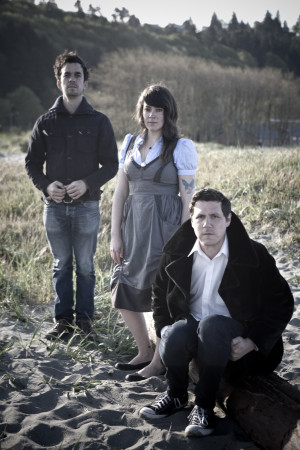An Interview with Damien Jurado
 For somebody who’s been compared favorably to Bruce Springsteen and Neil Young and Nick Drake, Damien Jurado has had a touch-and-go career, and a bit of an inferiority complex.
For somebody who’s been compared favorably to Bruce Springsteen and Neil Young and Nick Drake, Damien Jurado has had a touch-and-go career, and a bit of an inferiority complex.
Eight full-length records and loads of critical acclaim still found Jurado doing music part-time, and in interviews he has said that performing live was an obligation more than a joy. He hated leaving his family behind, particularly his son.
He’s a different performer now. He is doing music full-time. He claims he’s happier, and that he now enjoys performing, and he’s certainly more confident.
But Jurado is still harsh on his former self, to the point that nearly disavows his four-album output for Sub Pop, regardless of the respect those records earned him.
“It’s an interesting document to me about who I was then musically,” he said of his early efforts in a September phone interview. “I really had … not a clue what I was doing” the first time he went into a studio. He brought the songs, he said, but the producer directed the other musicians.
When critics claimed he sang flatly, he said, “I didn’t take offense to that, because they were right. I wasn’t a trained singer. … I just knew I could write songs. Maybe in the beginning that’s what I should have done. But I couldn’t really find anybody to do that [sing his songs] that I was clicking with.”
And he said that his distaste for performing stemmed from feeling like something of a fraud.
“I felt like I was ripping people off,” he said. “I wasn’t good at what I was doing. I can’t play this guitar great. I can’t sing great. I knew I could write good songs. That I knew. I knew I could write a song. I just felt the entire time, ‘This should not be me up here doing this.'”
His terrific new record Caught in the Trees – released last month on Secretly Canadian – marks several shifts for Jurado. It’s his first as a full-time musician. It’s his first in which “Damien Jurado” represents a band rather than an individual, with guitarist Eric Fisher and singer/cellist Jenna Conrad rounding out a trio. And the collection includes the personal, a first for a songwriter who told stories instead of confessing.
All of those changes he credits to his bandmates.
“Last year I had to make a decision,” he said. “I’m either going to stop doing this, pursue a career in God-knows-what,” or go after a music career full-force.
“If I had not met Eric or I had not met Jenna, I guarantee you I would not be doing music,” he said.
He also said that he put his future in their hands. “I pretty much sat them down … and said, ‘Here’s the deal. We’re either going to be a band, or I’m not going to do this any more.’ Kind of weird. It’s almost like a threat in some way. Like, ‘My career is over unless you help me.'”
The collaboration facilitated Jurado’s personal songwriting – even though he didn’t know it at the time.
“I … was starting to write songs that were more on a personal level, which is something I’ve never done – ever – in any record I’ve ever done,” he said. “But I didn’t really realize that until we were actually recording Caught in the Trees. … I’m not one that questions or even takes a good look at what the hell I’m writing down.”
The epiphany came when they were recording vocals for “Dimes,” in particular the lines “I’m placing a call to your husband / Does he know about me at all?”
He recalled: “And I realized, ‘Wow. I’m talking about me, like I’m calling me on the phone.’ I was going through a lot of crazy marital problems that ended up leading to a divorce.”
That level of self-awareness is apparent in “Coats of Ice”: “How does it feel to be what you sing about?”
For somebody reticent to stand in the spotlight, performing these songs has been surprisingly comfortable, Jurado said.
“The focus is on three of us now, which makes it easier. I don’t carry all the weight any more,” he said.
But he added that the band represents more than just musical support. “The both of them were there at the same time that I was going through all of this,” he said. “We were doing tours, and I’m emotionally breaking down on the stage, or off-stage, or in the car.” Jurado even canceled one tour, he said.
That struggle found its way onto Caught in the Trees – which took a year to make – but the album is anything but uncertain. Confident but delicate, it is full of sparkling songs.
“Paper Kite” soars and tugs like an analog Radiohead circa OK Computer, while “Trials” sounds like a cleaned-up Elliott Smith (in several senses) and is as pretty and fragile as anything he ever wrote and performed. The arrangements are spare but sure and varied, and Jurado’s voice is expressive, intimate, and convincing.
And while it sounds as if Jurado’s musical crisis has passed, don’t expect more songs about him.
“The whole personal thing is over now,” he said. “I compared it to having to use the bathroom. … It had to happen. I was holding it inside.”
(This article originally appeared in the River Cities’ Reader.)

